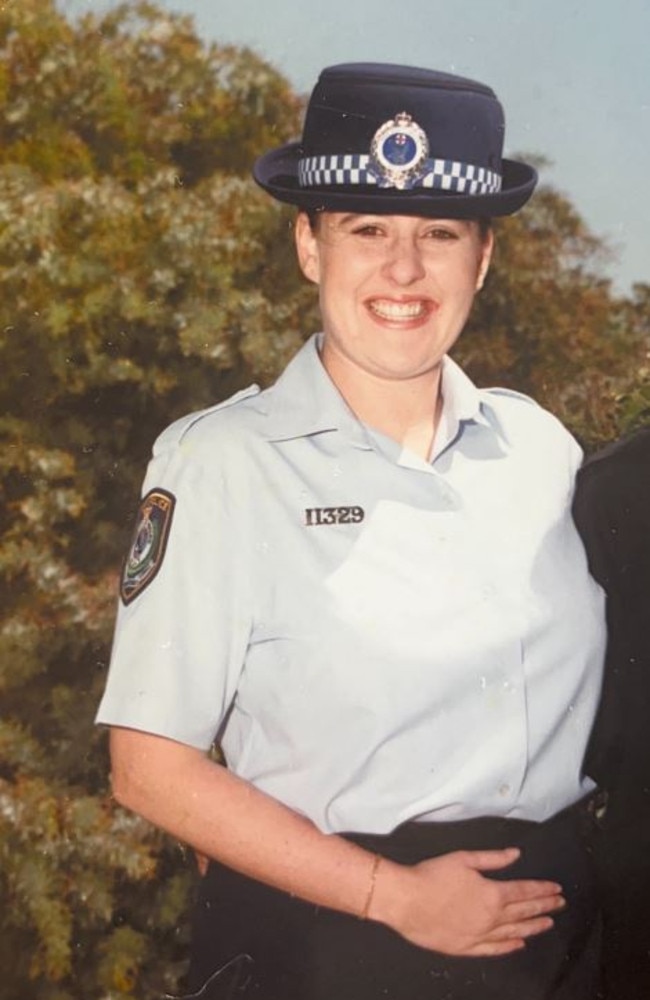Cop changes job after harrowing chat with 78-year-old woman who was catfished
Kylee Dennis spent 14 years in the police force, but a disturbing conversation with her friend’s elderly mother sparked a radical career change.
Kylee Dennis was no stranger to sharing devastating news with people that completely upturned their lives, having spent 14 years working in the New South Wales Police Force.
But that didn’t make the task of breaking an elderly woman’s heart any less difficult.
It was about this time last year that Ms Dennis found herself sitting across from her friend’s 78-year-old mother, revealing the sad truth about the man she’d fallen in love with.
And the aftermath of the experience wound up inspiring a career change, seeing Ms Dennis become a full-time catfish hunter.

“This all began when one of my good friends phoned me one day, very worried about her mum,” Ms Dennis told news.com.au. “Her mum was so excited because she’d met the love of her life online.
“I gave her mum a call to get some information about what was going on. She was talking to a businessman based overseas and she’d only seen photos of him, but she was absolutely besotted. She had totally fallen for him in only a few months.”
Ms Dennis spent 14 years in the New South Wales Police Force working as a detective, an undercover operative and even a hostage negotiator, before moving into child protection.
Her “rewarding and fabulous” career also gave her a finely tuned bullsh*t meter and her suspicions were instantly raised by what her friend’s mum was telling her.
A convincing con
Ms Dennis met with her friend’s mum and was shown photographs of the man she was in love with.
“I knew instantly he wasn’t who he said he was – it was a scam,” she recalled.
“He looked to be in his mid-50s, he was handsome and very physically fit. Some of them looked like they were from a professional photo shoot.”

Ms Dennis traced one of the images to its origin on a real estate business website in the United States, which saw her speak with the man in the photos.
“He confirmed he wasn’t in a relationship with my friend’s mum. Someone had essentially stolen his identity. Worse than that, that person wasn’t just using a lot of his photos, but also his daughter’s photos.
“The scammer invented a fake daughter named Elizabeth as a way, I suspect, of deepening his connection with my friend’s mum.”
Ms Dennis trawled through every email and message the woman had received over a six-month period, identifying patterns and red flags.
“It read like classic scammer language. They almost use templates that have been developed using psychological cues and triggers. It’s very sophisticated and that’s why it’s so effective.”

After compiling a dossier of evidence, Ms Dennis broke the difficult news.
“She was devastated. She cried because I’d broken her heart by sharing the news that this guy didn’t exist.”
Hearing a calling
After the experience, one of the woman’s friends caught wind of what had happened and urgently phoned Ms Dennis.
She too had met someone online and while they’d only been chatting for a few weeks, she was enamoured.
“I went through the same process with her and it was another scam,” she said. “It was absolutely unbelievable. I wondered how many other victims must be out there, feeling totally alone and isolated by this.”
Late last year, she established Two Face Investigations to help Australian clients validate the authenticity of potential romantic partners they meet online.
While it’s early days, she’s already helped people who were being conned, including a woman in love with a man, whose images were traced back to someone who died in a plane crash in 2019.
Another was an 80-year-old man who was sending $1000 a month to a woman he was in an online relationship with, but who didn’t really exist.

“I’ve also had clients who are actually talking to someone legitimate. It’s a real person who is who they say, who lives overseas, and who’s receiving money.
“They say they’re going to move to Australia, they’re in love, but then something comes up … and it’s clear they’re never coming. They’re using the clients to prop up their lifestyles. They have no intention of engaging in a real and meaningful relationship. They just want the money.”
‘Everyone is vulnerable’
Some might assume those who fall victim to romance scams tend to be old, easily misled and perhaps lacking a sophisticated understanding of technology, but that’s not the case.
Research conducted both here and abroad shows women aged between 45 and 54 who are well-educated are most likely to fall prey to a smooth-talking scammer.
Cassandra Cross, a senior lecturer in criminology at Queensland University of Technology, said all demographics are vulnerable to fraud.
However, financial losses among older people, Indigenous Australians, the disabled, and those from culturally and linguistically diverse communities are on the rise.
It’s rarely one person running a con, but rather a specially trained team, probably part of an international organised crime group, according to a paper published in the academic journal Cyberpsychology, Behaviour and Social Networking.
Using dating websites or apps and social networking services, scammers begin “grooming the victim [by] developing a hyper personal relationship with them … until they feel that the victim is ready to part with their money”, the research read.

They’re clever, highly organised and rely on a number of tried and tested techniques that ensure they can milk a large of victims for as much cash as possible.
A form of grooming
The extreme emotional ties formed can make victims easy to manipulate and leave them vulnerable to knowingly or unknowingly engaging in criminal activity,” criminologists Natalie Gately and James McCue from Edith Cowan University wrote in analysis for The Conversation.
It’s not uncommon for scams to play out over a year or longer – with reports of long plays stretching out for a decade, they wrote.
“This is not surprising, as romance scammers are in for the long haul and see the process as a long-term investment to establish intimacy and trust.”
That only gives the victim a greater sense of legitimacy – the longer things go, the “truer” the relationship seems.
“Eventually, the scammer has ensnared a person who has heavily invested in the relationship, has a strong emotional attachment and has been groomed to believe they ‘know and understand’ their partner,” they wrote.

Last year, the National Anti-Scam Centre received 3652 reports from Australians stung in romance scams, who reported losses totalling $34.3 million.
But for many victims, the loss of the ‘relationship’ – fake though it might’ve been – is more devastating than the financial consequences.
“Their experience is more psychologically damaging than other types of fraud, and is often compounded by a total lack of understanding from family and friends.” Gately and McCue wrote.
“Some victims remain in denial and are unable to accept the scam or separate the fake identity with a criminal. Some realise they’ve exposed themselves or performed sexual acts online, and feel humiliated and violated. They report feeling depressed, and even suicidal.
“But victims don’t often receive social support, reporting that family, friends and colleagues thought they were stupid, or were angry with them because of the financial loss, such as losing inheritance.
“Many victims keep their experience a secret or don’t disclose the entire story for fear of these types of reactions.”
Techniques mirror domestic violence
Research conducted by Dr Cross with colleague Molly Dragiewicz, also from Queensland University of Technology, revealed startling insights into the type of person behind romance scams.
“The techniques used by fraudsters in online romance scams are similar to those found in domestic violence cases,” they wrote of their findings for The Conversation.
Forms of intense psychological abuse are endured by victims, sometimes without them realising the extent of their mistreatment in the moment.
The techniques used include isolation, monopolisation, degradation, and emotional or interpersonal withdrawal, they wrote.

“Isolation occurs when offenders interrupt the support networks of their victims. Romance fraud offenders were quick to move communication with victims off the dating and social media platforms and onto private email or messaging.
“Monopolisation refers to offender efforts to consume the attention of their victims throughout the day.
“Degradation is behaviour that makes others feel less worthy. This includes verbal abuse such as name-calling, insults, and questioning the competency of victims.
“Romance fraud offenders periodically cut off communication. This resulted in victims becoming anxious about the status of their relationship or the wellbeing of the offender.”
That so many people can be persuaded into sending large amounts of money to someone they’ve never seen in real life shows how potent “non-physical forms of abuse can be”.






